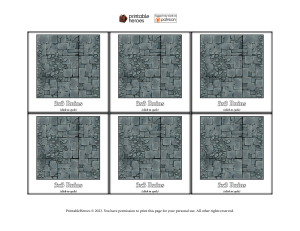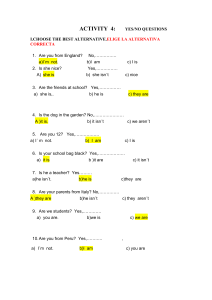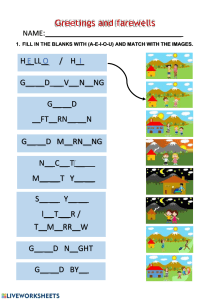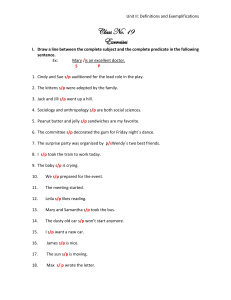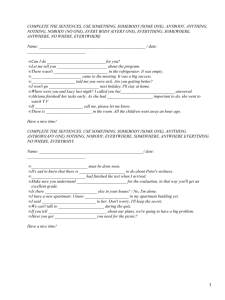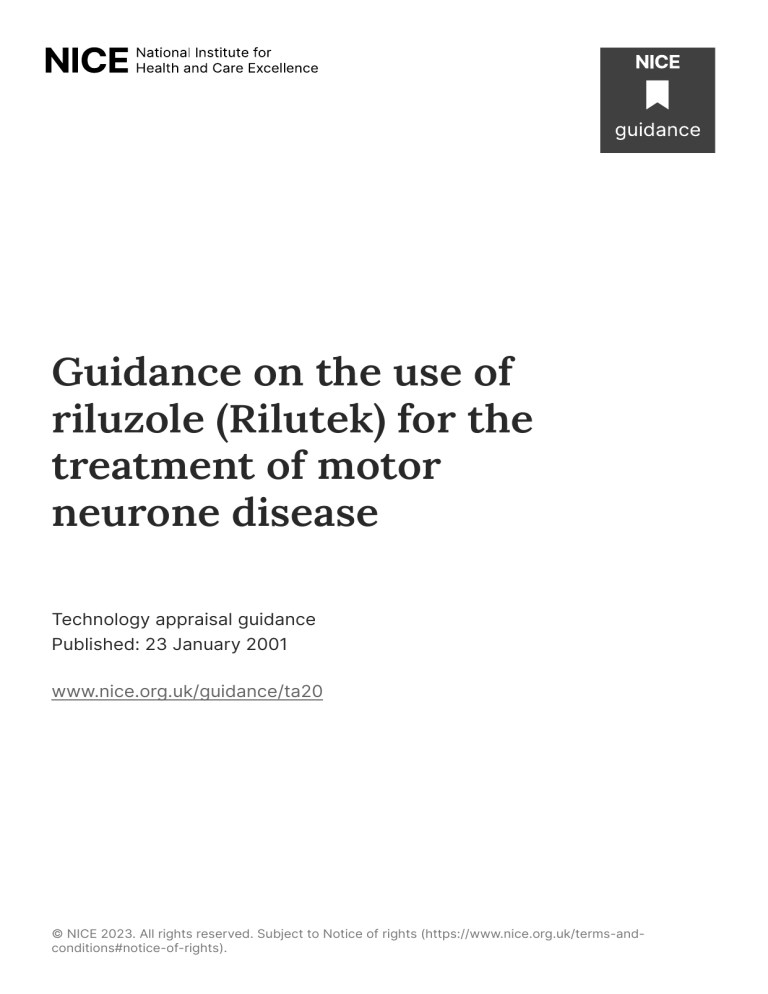
Guidance on the use of riluzole (Rilutek) for the treatment of motor neurone disease Technology appraisal guidance Published: 23 January 2001 www.nice.org.uk/guidance/ta20 © NICE 2023. All rights reserved. Subject to Notice of rights (https://www.nice.org.uk/terms-andconditions#notice-of-rights). Motor neurone disease - riluzole (TA20) Your responsibility The recommendations in this guidance represent the view of NICE, arrived at after careful consideration of the evidence available. When exercising their judgement, health professionals are expected to take this guidance fully into account, alongside the individual needs, preferences and values of their patients. The application of the recommendations in this guidance is at the discretion of health professionals and their individual patients and do not override the responsibility of healthcare professionals to make decisions appropriate to the circumstances of the individual patient, in consultation with the patient and/or their carer or guardian. All problems (adverse events) related to a medicine or medical device used for treatment or in a procedure should be reported to the Medicines and Healthcare products Regulatory Agency using the Yellow Card Scheme. Commissioners and/or providers have a responsibility to provide the funding required to enable the guidance to be applied when individual health professionals and their patients wish to use it, in accordance with the NHS Constitution. They should do so in light of their duties to have due regard to the need to eliminate unlawful discrimination, to advance equality of opportunity and to reduce health inequalities. Commissioners and providers have a responsibility to promote an environmentally sustainable health and care system and should assess and reduce the environmental impact of implementing NICE recommendations wherever possible. © NICE 2023. All rights reserved. Subject to Notice of rights (https://www.nice.org.uk/terms-and- Page 2 of conditions#notice-of-rights). 20 Motor neurone disease - riluzole (TA20) Contents 1 Recommendations .................................................................................................................... 4 2 Clinical need and practice ....................................................................................................... 5 3 The technology ........................................................................................................................ 7 4 Evidence ................................................................................................................................... 8 5 Implications for the NHS .......................................................................................................... 10 6 Further research ....................................................................................................................... 11 7 Implementation ......................................................................................................................... 12 8 Clinical audit advice ................................................................................................................. 13 Appendix A: Appraisal committee members ............................................................................. 14 Appendix B: Sources of evidence .............................................................................................. 17 Appendix C: Guidance on the use of riluzole (Rilutek) for the treatment of motor neurone disease – patient information ..................................................................................................... 19 Update information ..................................................................................................................... 20 © NICE 2023. All rights reserved. Subject to Notice of rights (https://www.nice.org.uk/terms-and- Page 3 of conditions#notice-of-rights). 20 Motor neurone disease - riluzole (TA20) 1 Recommendations 1.1 Riluzole is recommended for the treatment of individuals with the amyotrophic lateral sclerosis (ALS) form of motor neurone disease (MND). 1.2 Riluzole therapy should be initiated by a neurological specialist with expertise in the management of MND. Routine supervision of therapy should be managed by locally agreed shared care protocols undertaken by general practitioners. © NICE 2023. All rights reserved. Subject to Notice of rights (https://www.nice.org.uk/terms-and- Page 4 of conditions#notice-of-rights). 20 Motor neurone disease - riluzole (TA20) 2 Clinical need and practice 2.1 Motor neurone disease (MND) is characterised by progressive degeneration of the motor neurones of the brain, brain stem or spinal cord. Depending on the site of the lesions, characteristic signs may include spasticity, muscle stiffness, brisk or diminished reflexes, muscle wasting and fasciculation, and both flaccid and/or spastic weakness. 2.2 The classification and terminology used to describe the different MND syndromes are not always clear or consistent. This partly reflects uncertainties surrounding the underlying causes of MND and the mechanism of neuronal damage. There is also debate about the extent to which different syndromes are simply manifestations of the same disease process or whether there are several different disease mechanisms. 2.3 The term 'motor neurone disease' is used to describe variants of the disease – namely progressive muscular atrophy (PMA) and amyotrophic lateral sclerosis (ALS), which includes progressive bulbar palsy (PBP). ALS, which is characterised by both upper and lower motor neurone signs, is the most common form of MND, accounting for 65% to 85% of all cases. Adult onset MND usually starts insidiously with symptoms and signs including stumbling, foot drop, weakened grip, slurred speech, cramp, muscle wasting, twitching and tiredness. Other symptoms of MND include muscle stiffness, paralysis, incoordination and impaired speech, swallowing and breathing. Most individuals die from ventilatory failure, resulting from progressive weakness and wasting of limb, respiratory and bulbar muscles within approximately 3 years of the onset of symptoms. 2.4 NICE was advised that, despite the terms of the product licence, it has been common clinical practice for riluzole to be used in all of the forms of MND referred to in paragraph 2.3. This may in part be because the mainland European and UK nomenclature for the disease differs. In mainland Europe, the terms MND and ALS are often used interchangeably. This document refers to ALS specifically in accordance with the terminology used in the current product licence for riluzole. 2.5 There is no diagnostic test for MND. The diagnosis requires the demonstration of © NICE 2023. All rights reserved. Subject to Notice of rights (https://www.nice.org.uk/terms-and- Page 5 of conditions#notice-of-rights). 20 Motor neurone disease - riluzole (TA20) clinical signs affecting both the brain and spinal cord. Diagnosis is often delayed and can take more than 16 months from the onset of initial symptoms, which are commonly non-specific and include general fatigue. 2.6 The incidence of ALS ranges from 1.8 to 2.2 per 100,000 population and prevalence ranges from 4.0 to 4.7 per 100,000 population in the UK. Therefore at any one time about 2,000 individuals per year in England and Wales are affected by ALS. 2.7 There is a range of pharmacological interventions that provide symptomatic relief for people with MND. Surgical intervention may be necessary. Such interventions include percutaneous gastrostomy to enable feeding as the ability to swallow decreases and tracheostomy with or without ventilatory support to aid breathing as respiratory muscle weakness increases. 2.8 Supportive and palliative care is currently available for people with MND. A wide range of multidisciplinary health and social services is required, particularly in the late stages of the disease, and need to be tailored to suit individual needs. NHS, personal social service and voluntary sector services needed include physiotherapy, occupational therapy, speech and language therapy and augmentative communication, mobility aids and district nursing support. In the later stages of the disease, the following interventions may also be required: enteral feeding (for severe dysphagia), domiciliary or hospice care, and ventilatory support, including mechanical ventilation and tracheostomy. © NICE 2023. All rights reserved. Subject to Notice of rights (https://www.nice.org.uk/terms-and- Page 6 of conditions#notice-of-rights). 20 Motor neurone disease - riluzole (TA20) 3 The technology 3.1 Riluzole (Rilutek) is currently the only drug licensed for treating ALS in the UK. The licensed indication of riluzole is to extend life or the time to mechanical ventilation for individuals with ALS. The Summary of Product Characteristics (SPC) recommends that riluzole should not be used in any other form of motor neurone disease (MND). The SPC also suggests that treatment should only be initiated by specialist physicians with experience in the management of MND. 3.2 It is hypothesised that excessive stimulation of glutamate receptors on neurones may cause or play an important role in the destruction of motor neurones in MND. Glutamate is a neurotransmitter that tends to excite motor neurone cells. In vitro, riluzole inhibits the release of glutamate, decreases firing of motor neurones induced by glutamate receptor agonists and thus protects cells from glutamatemediated damage. 3.3 The main caution for use of riluzole is history of abnormal hepatic function. Regular blood testing (every month for 3 months, then every 3 months for a further 9 months and annually thereafter) is recommended to monitor hepatic function. Side effects include nausea, vomiting, weakness, tachycardia, somnolence, headache, dizziness, vertigo, pain, parasthesia and alterations in liver function tests. Side effects of dizziness or vertigo may affect the performance of skilled tasks such as driving. Riluzole is contraindicated in the presence of hepatic and/or renal impairment and during pregnancy and breastfeeding. 3.4 The license dosage of riluzole is 100 mg per day (50 mg twice per day). The NHS list price (excluding VAT) of riluzole is £286 per treatment course, which amounts to an annual cost of £3,718. An additional cost, incurred for monitoring liver enzymes, has been estimated to be a maximum of £24 per year, giving a total annual cost of treatment with riluzole of £3,742. © NICE 2023. All rights reserved. Subject to Notice of rights (https://www.nice.org.uk/terms-andconditions#notice-of-rights). Page 7 of 20 Motor neurone disease - riluzole (TA20) 4 Evidence 4.1 Four randomised controlled trials (including a number of UK centres) in patients who fall within the diagnostic category of ALS have compared riluzole with placebo (a total of 1,477 individuals). Three trials used riluzole at 100 mg/day and one used doses of 50, 100 and 200 mg/day. Individuals were under 75 years, had a forced vital capacity (FVC) greater than or equal to 60% in 3 trials, with 2 of these also excluding patients who had suffered from MND for more than 5 years. The fourth trial recruited individuals who were older or who had a greater duration of disease (older than 5 years) or who had an FVC less than 60%. 4.2 All trials used tracheostomy-free survival as a primary outcome. Most individuals (in all 4 trials) were prevalent, rather than incident cases. 4.3 The assessment report reviewed the results from all 4 of the trials identified and reported riluzole to be associated with a relative reduction in hazard ratio for tracheostomy-free survival at 18 months of 17% (hazard ratio of 0.88, 95% confidence interval 0.75 to 1.02). There was some evidence of heterogeneity across the results of these 4 trials. 4.4 When data on functional status were combined, a small reduction in the rate of deterioration of functional status was observed, although the statistical methods used to calculate changes were questionable. Furthermore it is not clear whether the estimated differences obtained using these methods were clinically significant. 4.5 There was little evidence of a difference in adverse events between riluzole and placebo. 4.6 There is strong clinical support for the use of riluzole in forms of MND other than ALS but the current licensed indications limit its use to ALS alone. The inclusion criteria for the published clinical trials has been restricted to a diagnosis of the ALS form of MND alone. 4.7 Current estimates of the cost-effectiveness of riluzole must be viewed cautiously. Some of the key remaining uncertainties on benefits for the economic analysis © NICE 2023. All rights reserved. Subject to Notice of rights (https://www.nice.org.uk/terms-and- Page 8 of conditions#notice-of-rights). 20 Motor neurone disease - riluzole (TA20) concern the disease stage(s) in which the survival gain is experienced, the quality of life utility weights for ALS health states and the mean gain in life expectancy for individuals who take riluzole. Estimates from the 2 fully published trials suggest a gain in median tracheostomy-free survival time of 2 to 4 months. It is clear that riluzole is associated with a net increase in costs to the health service, though the magnitude of the increase is difficult to predict accurately. 4.8 Using a published Markov model and 18-month trial follow-up data, the manufacturer's submission provided a base-case cost per quality-adjusted life year (cost/QALY) estimate of £18,000 to £29,000 for riluzole. Based on a reanalysis of this Markov model using an alternative, more conservative estimate of time-dependant probabilities, the assessment report derived discounted cost per QALY estimates for riluzole of between approximately £34,000 to £43,500. These later estimates are consistent with the results obtained by the assessment report authors when using Weibull and Gompertz models to extrapolate survival over time. 4.9 The appraisal committee considered the evidence of the clinical and cost effectiveness of this technology by reference to the Directions to the Institute issued by the Secretary of State. The Committee took account of the severity and relatively short life span of people with ALS and in particular, as directly reported to it, of the values which patients place on the extension of tracheostomy-free survival time. With these considerations in mind, the committee considered that the net increase in cost for the NHS of the use of riluzole in this indication was reasonable when set against the benefit, assessed as extended months of an acceptable (to patients) quality of life. 4.10 The documentation and opinion available to the appraisals committee is set out in appendix B. © NICE 2023. All rights reserved. Subject to Notice of rights (https://www.nice.org.uk/terms-and- Page 9 of conditions#notice-of-rights). 20 Motor neurone disease - riluzole (TA20) 5 Implications for the NHS 5.1 It is estimated that the potential budget impact to the NHS in England and Wales of making riluzole available to all individuals with ALS would be at maximum around £7.5 million per annum. Given an estimated current level of funding of riluzole for ALS of about £2 million per annum, this represents an additional cost to the NHS in England and Wales of about £5 million. However, there is considerable uncertainty about the proportion of patients who will take up this therapy. Moreover, these figures do not take into account the additional NHS costs of patient survival. 5.2 A diagnosis of motor neurone disease (MND) should be made or confirmed by a specialist physician with experience in the management of MND after appropriate investigations. In most cases, the specialist will be responsible for monitoring the progress of the disease and the safe use of riluzole. The needs of people with MND demand flexibility, and this monitoring role can be taken up by the general practitioner or by other physicians involved in providing shared care. 5.3 In the latter stages of their disease, patients may wish to review their continued use of riluzole and they should be provided with the opportunity to discontinue treatment, if after discussion with the responsible clinician, they consider it appropriate. © NICE 2023. All rights reserved. Subject to Notice of rights (https://www.nice.org.uk/terms-and- Page 10 of conditions#notice-of-rights). 20 Motor neurone disease - riluzole (TA20) 6 Further research 6.1 Further trials of riluzole are required to examine the relative effectiveness of differing dosing regimens. 6.2 Methods for the early diagnosis of MND require development as they may enable earlier treatment and enhanced clinical outcomes. © NICE 2023. All rights reserved. Subject to Notice of rights (https://www.nice.org.uk/terms-and- Page 11 of conditions#notice-of-rights). 20 Motor neurone disease - riluzole (TA20) 7 Implementation 7.1 NHS trusts with responsibility for treating people with motor neurone disease (MND) should enable neurologists to consider the option of using riluzole in the way set out in section 1. 7.2 Neurologists with responsibility for patients with MND should review their current practice in line with the guidance set out in section 1. 7.3 The patient information attached to this guidance as appendix C can be drafted into local information leaflets. © NICE 2023. All rights reserved. Subject to Notice of rights (https://www.nice.org.uk/terms-and- Page 12 of conditions#notice-of-rights). 20 Motor neurone disease - riluzole (TA20) 8 Clinical audit advice 8.1 To enable clinicians to audit their own compliance with this guidance, it is recommended that treatment plans are recorded for each patient. 8.2 This information should be incorporated into local audit data recording systems and consideration given (if not already in place) to the establishment of appropriate categories in routine electronic record-keeping systems used in hospitals and the multidisciplinary groups working in support of people with motor neurone disease (MND). 8.3 Relevant clinical guidelines and protocols linking the multidisclipinary working for people with MND should be reviewed in the light of this guidance. 8.4 Prospective clinical audit programmes should record the proportion of treatments adhering to this guidance. Such programmes are likely to be more effective in improving patient care when they form part of the organisation's formal clinical governance arrangements and where they are linked to specific post-graduate activities. © NICE 2023. All rights reserved. Subject to Notice of rights (https://www.nice.org.uk/terms-and- Page 13 of conditions#notice-of-rights). 20 Motor neurone disease - riluzole (TA20) Appendix A: Appraisal committee members The appraisal committee is a statutory committee whose members sit for 3 years. They are supplemented by technology-specific experts, as indicated in appendix B. Professor R. L. Akehurst Dean, School of Health Related Research Sheffield University Professor David Barnett (Chairman) Professor of Clinical Pharmacology University of Leicester Professor Sir Colin Berry Professor of Morbid Anatomy St Bartholomew's and Royal London School of Medicine Dr Sheila Bird MRC Biostatistics Unit, Cambridge Professor Martin Buxton Director of Health Economics Research Group Brunel University Professor Yvonne Carter Professor of General Practice and Primary Care St Bartholomew's and Royal London School of Medicine Dr Karl Claxton Lecturer in Economics University of York Professor Duncan Colin-Jones Professor of Gastroenterology University of Southampton Professor Sarah Cowley Professor of Community Practice Development Kings College, London Dr Nicky Cullum Reader in Health Studies University of York © NICE 2023. All rights reserved. Subject to Notice of rights (https://www.nice.org.uk/terms-and- Page 14 of conditions#notice-of-rights). 20 Motor neurone disease - riluzole (TA20) Mr Chris Evennett Chief Executive Mid-Hampshire Primary Care Group Professor Terry Feest Clinical Director and Consultant Nephrologist Richard Bright Renal Unit and Chairman of the UK Renal Registry Ms Jean Gaffin Formerly Executive Director National Council for Hospice and Specialist Palliative Care Service Mrs Sue Gallagher Chief Executive Merton, Sutton and Wandsworth Health Authority Dr Trevor Gibbs International Medical Operations Director GlaxoWellcome R&D Ltd Mr John Goulston Director of Finance The Royal Free Hampstead NHS Trust Professor Philip Home Professor of Diabetes Medicine University of Newcastle Dr Terry John General Practitioner The Firs, London Dr Diane Ketley Research into Practice Programme Leader NHS Modernisation Agency Dr Mayur Lakhani General Practitioner, Highgate Surgery, Leicester and Lecturer, University of Leicester Mr M Mughal Consultant Surgeon Chorley and South Ribble NHS Trust Mr James Partridge Chief Executive Changing Faces © NICE 2023. All rights reserved. Subject to Notice of rights (https://www.nice.org.uk/terms-and- Page 15 of conditions#notice-of-rights). 20 Motor neurone disease - riluzole (TA20) Professor Philip Routledge Professor of Clinical Pharmacology University of Wales Professor Andrew Stevens Professor of Public Health University of Birmingham © NICE 2023. All rights reserved. Subject to Notice of rights (https://www.nice.org.uk/terms-and- Page 16 of conditions#notice-of-rights). 20 Motor neurone disease - riluzole (TA20) Appendix B: Sources of evidence The following documentation and opinion was made available to the committee: • Assessment reports: - Stewart A, Sandercock J, Bryan S, et al. (2000) The clinical effectiveness and cost effectiveness of Riluzole in the Treatment of Motor Neurone Disease. West Midlands Development & Evaluation Service, University of Birmingham - Update assessment report prepared by the West Midlands Development and Evaluation Service • Manufacturer/sponsor submissions: - Aventis Pharma • Professional/specialist group, patient/carer group and trade association submissions: - Association of British Neurologists and Royal College of Physicians - Association for Palliative Medicine of Great Britain and Ireland - Chartered Society of Physiotherapy - Motor Neurone Disease Association - Royal College of General Practitioners - Royal College of Nursing - Royal College of Speech and Language Therapists • External expert and patient advocate submissions: - Professor Pamela Shaw, Section of Neurology, Royal Hallamshire Hospital, Sheffield - Ms Julia Johnson, Speech and Language Therapist, King's College Hospital - Mr George Levvy, Chief Executive, MND Association © NICE 2023. All rights reserved. Subject to Notice of rights (https://www.nice.org.uk/terms-and- Page 17 of conditions#notice-of-rights). 20 Motor neurone disease - riluzole (TA20) - Mr Chris Davies, Member of MND Association. © NICE 2023. All rights reserved. Subject to Notice of rights (https://www.nice.org.uk/terms-and- Page 18 of conditions#notice-of-rights). 20 Motor neurone disease - riluzole (TA20) Appendix C: Guidance on the use of riluzole (Rilutek) for the treatment of motor neurone disease – patient information A summary of this guidance for patients and carers can be found on our website. © NICE 2023. All rights reserved. Subject to Notice of rights (https://www.nice.org.uk/terms-and- Page 19 of conditions#notice-of-rights). 20 Motor neurone disease - riluzole (TA20) Update information Minor changes since publication March 2014: Minor maintenance. March 2012: Minor maintenance. ISBN: 978-1-4731-5618-0 © NICE 2023. All rights reserved. Subject to Notice of rights (https://www.nice.org.uk/terms-and- Page 20 of conditions#notice-of-rights). 20
